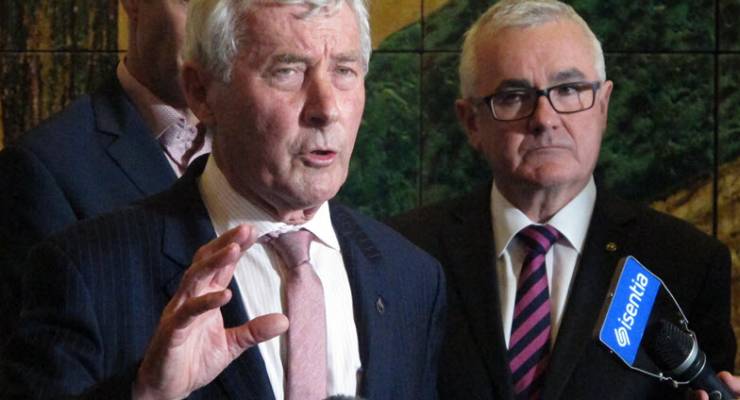
In 2018, the people we invited our readers to vote for Person of the Year were largely people who pushed back against all that is degraded and hopeless about public life in Australia. This is particularly true of the pair our readers deservedly voted in — a principled stand, a much needed source of hope, or at the very least energy, that hasn’t gotten nearly the attention it demands.
Winner: Witness K and Bernard Collaery
As Bernard Keane wrote back in July, the “Howard government’s bugging of the Timor-Leste cabinet in 2004 is the Watergate of Australian politics, a crime committed by a pack of bullies who believed themselves above the law, not against a rival political organisation that was capable of fighting back through the political system, but a struggling, deeply impoverished neighbour.”
He goes on to note the dispiriting way that Australia’s Watergate is distinct: unlike the Nixon version, the opposition and most of the media are united in indifference. The scandal of 2018 has been that our greatest scandal has barely been a scandal at all.
In the teeth of this combination of crime, cover-up, cowardice and apathy are a former senior Australian Secret Intelligence Service (ASIS) officer, known to the public as Witness K, and his lawyer Bernard Collaery. In 2013, Collaery, at the time acting for both K and the Timor-Leste government, revealed that ASIS had illegally bugged the Timor-Leste cabinet. The bugging was to secure Australia an advantage in negotiations with the new state — which was only a few years out of a horrific war that had ended decades of brutal occupation — over the resources in the Timor Sea. This was done under instruction from the Howard government. The minister for foreign affairs at the time, Alexander Downer, would later take up work with the primary beneficiary of this treaty, Woodside. So would the then-secretary of the Department of Foreign Affairs and Trade.
This grubby, criminal act of bullying and corruption has been covered up in the intervening years (by both sides of politics) through lies and evasions. Meanwhile, K and Collaery have been relentlessly harassed and intimidated, with Collaery’s offices raided by ASIO and K held under “effective house arrest”. This state-sanctioned thuggery culminated this year in a vexatious prosecution, and an attempt to imprison them both.
The lack of a public outcry and sustained media pressure — despite the laudable efforts of Greens Senator Nick McKim, Centre Alliance’s Rebekha Sharkie, Rex Patrick and Tim Storer, and most of all independent Andrew Wilkie — only underlines why these two are such worthy winners. Despite apparent unconcern from the opposition, radio silence from large sections of the media and, as a result, a largely oblivious public, they have made unimaginable sacrifices and taken huge risks, because, simply, it was the right thing to do. Because it was the only thing to do.
Whatever happens from here, and whether they know it or not, Australia owes a great deal to Bernard Collaery and Witness K.
The other nominees were:
Saxon Mullins: For her bravery in detailing her alleged rape, and the conversation around consent and the law that it has brought about.
Rowena Orr: For her incisive, whip-smart questioning of crooked bank executives in the royal commission, bringing to light shocking financial crimes.
Anita Jacoby: For being the one board member of AACTA to push back against the organisation’s servile and obsequious letter to Geoffrey Rush following the sexual harassment claims levelled against him.
Angela Williamson: Williamson’s strong (and savvy) response to being fired from Cricket Australia (in disgraceful circumstances) for pro-choice tweets fed a wider conversation about access to safe abortion in Australia and workplace culture towards women in particular.
Tim Soutphommasane: Our former race discrimination commissioner’s indefatigable commitment to calling out racism (a full-time job in Australia at the best of times, and 2018 was decidedly not the best of times) was only brought into sharper relief when we met his replacement, who doesn’t think it’s his place to decide what’s racist.
Hannah Gadsby: Gadsby’s stand-up special Nanette, by turns stirring and sobering, brought her well deserved international recognition and perfectly reflected and informed post-Me Too discussions about gender, power and entitlement.








Just a little thing, but it grates. How about something other than “whip-smart” to describe a woman who’s intelligent?
Yes, interesting The lack of a public outcry and sustained media pressure on this deplorable behaviour by our government. Also interesting, but not surprising that the shock jocks have been silent, underlines which side of politics butters their bread doesn’t it. overall absolutely deplorable behaviour by our elected representatives.
Neither of the two main political parties is innocent in this shameful matter, so I really can’t understand why the MSM are not jumping on another juicy political scandal, but something is seriously working to keep everyone quiet – it can’t be simple embarrassment for their dastardly deeds in committing the crime and all of the subsequent secrecy and squirms to avoid a ‘mea culpa’. The whole situation has been Duttonised.
Assuming that they are not so cowed as to be ‘self-Duttoning’ – what a ghastly image – which is quite common when the Establishment is threatened.
Certainly an impressive list of nominees Bernard.
Your choices of Collaery & Witness K is sound, especially considering what they are up against in standing up for in exposing the appalling behavior of the Howard government in bugging the offices of the government of Timor Leste .
Ever more appalling is the complicity of our alternative government, the Labor Party.
Apologies Charlie, not Bernard.
Although Bernard has pushing hard in covering this sordid affair.
As you’ve noted in the past, both T1 & T2, were complicit in crushing the Customs airport bloke, despite Krudd using his name in the 2007 manifesto and promising restitution.